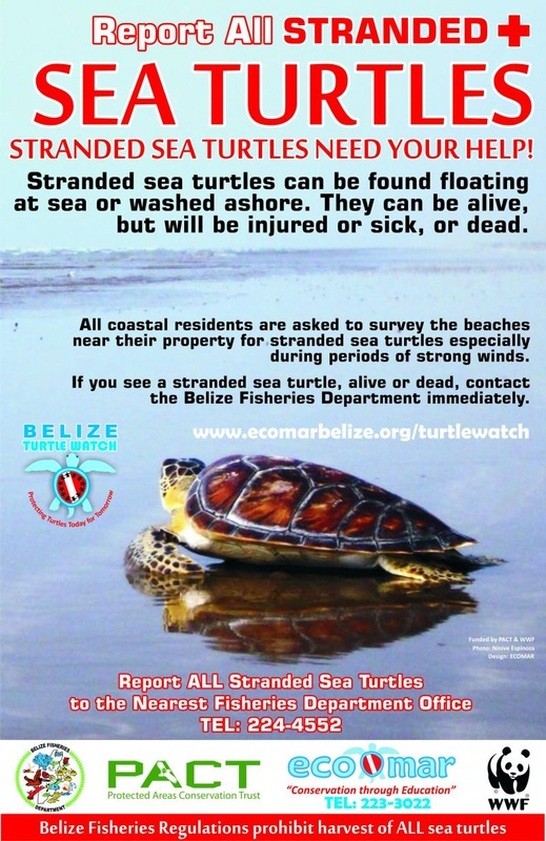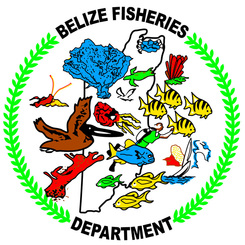Stranded Sea Turtles
When sea turtles become sick or injured they are often found stranded along the shore or floating at sea. A goal of the Belize Turtle Watch Program is to record all stranded sea turtles, rehabilitate those found alive, and conduct a necropsy of those found dead. Often a necropsy can identify the cause of death. Once threats are identified it may be possible to mitigate the impacts to sea turtles in Belize.
Live vs Dead Stranded Sea Turtles
|
If sea turtles are found alive and stranded then they are likely sick or injured. In these cases members of the Turtle Network work together to rehabilitate the turtle so it can be released back into the wild. Sometimes a turtle is too sick for rehabilitation and dies of its illness or injuries. But the important thing is that we try to assist the turtle to recover from its illness or injuries so it can be released back into the sea. Live stranded sea turtles are reported on the Sea Turtle Rehab page.
The majority of stranded sea turtles are dead and these individuals need to be measured and cause of death identified so that threats can be minimized. Sometimes the cause of death is obvious, like the loggerhead below with a chop wound on its front flipper or boat strikes. But other times biologists may need to conduct a necropsy to determine cause of death. Presented below is a summary of some sea turtles that have been examined by members of the Belize Sea Turtle Conservation Network.
|
Stranded sea turtles can be found either floating at sea or washed ashore. They may be alive or dead. If alive, they will be injured or sick and unable to heal and successfully live on their own if they are not properly cared for and rehabilitated. As a part of the Annual Sea Turtle Census we ask that coastal residents survey the beaches near their property for stranded sea turtles especially during periods of strong winds that wash in tired juvenile turtles.
Boat Collisions
While out at sea, we ask boat operators to keep an eye out for floating turtles. There are many reasons why the turtle may be floating. The turtle could be on the surface as it comes up for a breath of air, or it may be mating, or may be injured, sick or dead. Injuries to turtles can occur for a wide variety of reasons. It may be due to having been struck by a boat, or it may be caught up in gill nets or fishing lines. Fishermen are asked to properly dispose of all fishing line and nets, as many sea turtles easily become entangled in discarded fishing gear found floating at sea.
Boat Collisions
While out at sea, we ask boat operators to keep an eye out for floating turtles. There are many reasons why the turtle may be floating. The turtle could be on the surface as it comes up for a breath of air, or it may be mating, or may be injured, sick or dead. Injuries to turtles can occur for a wide variety of reasons. It may be due to having been struck by a boat, or it may be caught up in gill nets or fishing lines. Fishermen are asked to properly dispose of all fishing line and nets, as many sea turtles easily become entangled in discarded fishing gear found floating at sea.
Plastics
Another unfortunate yet common reason turtles may be found stranded is due to marine debris. Discarded plastic such as plastic trash bags, bottles, balloons, and other packaging materials closely resemble jellyfish and are frequently observed in the stomachs of stranded sea turtles. Swallowing sharp debris, whether plastics, metal, or glass, can cut the stomach and intestines when digested causing internal infections in sea turtles. Sometimes turtles eat so much plastic that nothing else will pass through their gut and they will die.
Other debris in the water may inhibit the usual feeding and mating activities of sea turtles. Entanglement of sea turtles in large masses of marine debris can result in starvation, drowning or increased vulnerability to predators and boat collisions.
The Belize Turtle Watch Program thanks everyone who has been reporting stranded sea turtles. Despite the sad, unfortunate reports, it is important for us to document all deaths in order to identify threats and find ways to mitigate these impacts.
Another unfortunate yet common reason turtles may be found stranded is due to marine debris. Discarded plastic such as plastic trash bags, bottles, balloons, and other packaging materials closely resemble jellyfish and are frequently observed in the stomachs of stranded sea turtles. Swallowing sharp debris, whether plastics, metal, or glass, can cut the stomach and intestines when digested causing internal infections in sea turtles. Sometimes turtles eat so much plastic that nothing else will pass through their gut and they will die.
Other debris in the water may inhibit the usual feeding and mating activities of sea turtles. Entanglement of sea turtles in large masses of marine debris can result in starvation, drowning or increased vulnerability to predators and boat collisions.
The Belize Turtle Watch Program thanks everyone who has been reporting stranded sea turtles. Despite the sad, unfortunate reports, it is important for us to document all deaths in order to identify threats and find ways to mitigate these impacts.
Please be sure to report Stranded Turtles
|




